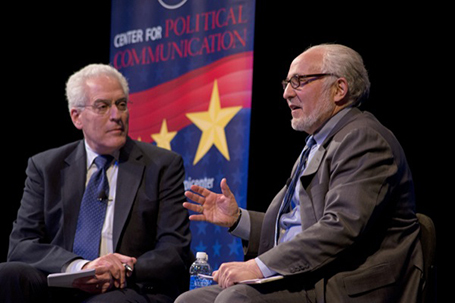Global Agenda: Asian pivot
Issues abound as U.S. shifts foreign policy focus to Asia, journalist says

The United States is negotiating a delicate situation as it redirects its foreign policy focus from traditional spheres of influence to Asia, journalist and author James Mann told a University of Delaware Global Agenda series audience on Wednesday, March 20, in Mitchell Hall.
Known as “the pivot,” the shift has come in response to the growing power of China.
Mann, an award-winning journalist and author-in-residence at the Johns Hopkins School of Advanced International Studies, said the new thinking has emerged as America is on the verge of energy independence through new extraction technologies that could make it less dependent on oil from the Middle East.
Less tied to the Middle East, the U.S. would be free to scale back its military presence there and redirect resources to Asia.
However, Mann said this line of thought is worrisome to longstanding allies, particularly Israel but also Asian nations such as Japan, South Korea and the Philippines that depend on Middle Eastern oil and on open sea lanes maintained by the U.S. Navy to transport it.
American allies are “nervous about it,” he said, and believe any U.S. retreat from the Middle East should be done slowly, not precipitously. Asian allies fear dependence on a nation other than the U.S. – perhaps China – to protect their supplies.
Mann said the administration of President Barack Obama came into office determined to have a positive relationship with China but found the growing power in a new place, flexing its power, particularly in the South China Sea.
The administration was forced to take a tougher stance with China and Mann said that “American policy will depend for the next few years on what China does.”
Currently on the national security radar is Chinese cyberwarfare, which Mann said “has risen dramatically as a national security issue” as officials agree that the nation’s cyberhacking must be reined in.
The parties and foreign policy
Mann, who has written books about the administrations of Obama and George W. Bush, offered a primer on the parties and their outlook on foreign policy.
Republicans, both realists and neo-conservatives, tend to unify on the concept of American military power as a force for good in the world, Mann said, although noting that there is an isolationist wing in the party currently led by U.S. Sen. Rand Paul.
Democrats, who gained a large base from the anti-war movement of the 1960s and 1970s, tend to agonize more over the concept, particularly when it means troops on the ground.
Concerning foreign policy views, there are currently three “generations” of Democrats working in the White House, Mann said.
The first, which includes Vice President Joe Biden, a UD alumnus, is the post-Vietnam generation that came of age at a time when they “saw how the use of force can go disastrously wrong,” but which was embarrassed by its opposition to the first Gulf War under President George H.W. Bush and later felt the need to prove itself by supporting the second war.
The second is the generation that came of age during the administration of President Bill Clinton, and which includes former Secretary of State Hillary Clinton. This group, Mann said, came of age in an era of “triumphalism” and came to view the U.S. as “the indispensable nation.”
The third he calls the “Obamians,” including the president himself, and this generation came of age post-9/11. It has some disdain for the Democrats who supported the second Gulf War.
However, Mann said that the public should not be confused because “on questions involving the use of military force, Obama is not a dove.”
Regarding the second Gulf War, Mann said Obama noted that “he was not opposed to all wars, he was opposed to dumb wars,” believing that the focus should have been on Afghanistan and not Iraq – a belief he carried out as president through the “surge.”
The U.S. and Iran
Asked if Mann thought Obama would go to war with Iran, he did not rule it out.
“He has refused to rule out force,” he said, and is committed to a policy of not accepting nuclear weapons in the hands of Iran.
Obama’s preference is a negotiated settlement, Mann said, adding that if he is “completely stiffed” by the Iranians in that effort, war could be possible. “We’ll find out in about 18 months, or so,” he said.
About Global Agenda
Global Agenda is sponsored by the Center for Political Communication and presented by the Institute for Global Studies, the Department of Communication and the Department of Political Science and International Relations.
The theme of this year’s Global Agenda is “America’s Role in the World.”
The series is moderated by Ralph Begleiter, director of UD’s Center for Political Communication.
The series is free and open to the public.
It will continue at 7:30 p.m., Wednesday, April 3, in Mitchell Hall, with a presentation on “The U.S. Role in Europe” by Heather A. Conley, a former U.S. diplomat and senior fellow and director of the Europe Program at CSIS, a major bipartisan think tank in Washington, D.C.
